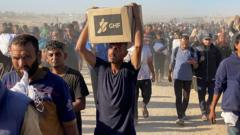Witnesses report horrific scenes as groups of Palestinians gathered at the new aid distribution hubs before dawn on Tuesday, where Israeli troops allegedly opened fire. A foreign observer described the chaos as "total carnage," starkly contrasting with the Israeli military's assertion that shots were fired only in response to perceived threats.
The newly established aid hubs, created by Israel with support from the United States, were intended to replace operations previously conducted by various international aid organizations, including the United Nations. These hubs are managed by the Gaza Humanitarian Foundation (GHF), which employs armed security from a U.S. company for protection in areas of southern Gaza that are under strict Israeli control.
This new system arose after a comprehensive ban on aid shipments left many in Gaza vulnerable to famine. Israel maintains that prior UN efforts favored Hamas, a charge the UN vehemently denies, ensuring they can account for all distributed aid and refusing to cooperate with the GHF. The system is plagued by significant flaws that have raised concerns among aid professionals.
Jake Wood, the head of the GHF, stepped down just days ago, citing the organization's inability to uphold vital humanitarian principles, including neutrality and independence. Unlike the UN, which had a broad network for distributing essential food and medicine, the GHF's operations force individuals to navigate harsh war-torn conditions for meager rations, leading to chaotic distributions where only the strongest can secure aid.
In a recent BBC interview, Volker Türk, UN High Commissioner for Human Rights, condemned the GHF plan as showing "utter disregard for civilians." He emphasized the desperation of those seeking food and medicine and criticized Israel's blatant disregard for wartime ethics.
Proponents of the GHF argue it offers some relief, while critics contend it serves as a means for Israeli control over Palestinian civilians. Some Israeli officials have openly suggested food aid could be wielded as a strategic weapon against Hamas.
The backlash against Israel's handling of aid comes at a precarious time, with key allies like the UK, France, and Canada mounting pressure for significant changes in its Gaza strategy, including the urgent need for humanitarian access for over two million civilians. These nations are contemplating possible repercussions, including sanctions, should Israel continue its aggressive tactics. As the situation intensifies, global observers express alarm at the humanitarian crisis unfolding in Gaza.
The newly established aid hubs, created by Israel with support from the United States, were intended to replace operations previously conducted by various international aid organizations, including the United Nations. These hubs are managed by the Gaza Humanitarian Foundation (GHF), which employs armed security from a U.S. company for protection in areas of southern Gaza that are under strict Israeli control.
This new system arose after a comprehensive ban on aid shipments left many in Gaza vulnerable to famine. Israel maintains that prior UN efforts favored Hamas, a charge the UN vehemently denies, ensuring they can account for all distributed aid and refusing to cooperate with the GHF. The system is plagued by significant flaws that have raised concerns among aid professionals.
Jake Wood, the head of the GHF, stepped down just days ago, citing the organization's inability to uphold vital humanitarian principles, including neutrality and independence. Unlike the UN, which had a broad network for distributing essential food and medicine, the GHF's operations force individuals to navigate harsh war-torn conditions for meager rations, leading to chaotic distributions where only the strongest can secure aid.
In a recent BBC interview, Volker Türk, UN High Commissioner for Human Rights, condemned the GHF plan as showing "utter disregard for civilians." He emphasized the desperation of those seeking food and medicine and criticized Israel's blatant disregard for wartime ethics.
Proponents of the GHF argue it offers some relief, while critics contend it serves as a means for Israeli control over Palestinian civilians. Some Israeli officials have openly suggested food aid could be wielded as a strategic weapon against Hamas.
The backlash against Israel's handling of aid comes at a precarious time, with key allies like the UK, France, and Canada mounting pressure for significant changes in its Gaza strategy, including the urgent need for humanitarian access for over two million civilians. These nations are contemplating possible repercussions, including sanctions, should Israel continue its aggressive tactics. As the situation intensifies, global observers express alarm at the humanitarian crisis unfolding in Gaza.



















